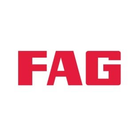

| Item # | d | D | B | r | Static Load Rating | Dynamic Load Rating |
| 23030EAD1 | 5.9055 in 150.000 mm |
8.8583 in 225.000 mm |
2.2047 in 56.000 mm |
0.0827 in 2.100 mm |
201000 lbf 893000 N 893.00 kN |
148000 lbf 660000 N 660.00 kN |
1. Design features and characteristics
Spherical roller bearings consist of an outer ring having a continuous spherical raceway and two rows of barrel-shaped rollers guided by an inner ring with two raceways. (Refer to Fig. 1) This bearing has self-aligning properties, and therefore is suited for use where misalignment between the inner and outer rings occurs from housing installation error or shaft bending.
Spherical roller bearings have a large capacity for radial loads, axial loads in either direction, and combined loads. They are also suited for applications where vibration and shock loads are encountered. When spherical roller bearings are used with a vertical shaft or under a large axial load, the load on the rollers of the row that is not subject to the axial load becomes small, and the resulting skidding on the rollers may result in wear. If the ratio of the axial load to the radial load exceeds the factor e in the dimension table (Fa/Fr > e), consult NTN Engineering.
In addition to spherical roller bearings with cylindrical bores, spherical roller bearings with tapered bores are also available. Bearings with tapered bores are specified by the suffix “K” at the end of the spherical roller bearing part number. The standard taper ratio is 1:12 for bearings with a “K” suffix; for bearings in series 240 and 241, the suffix “K30” indicates the taper ratio for a bearing is 1:30. Most tapered bore bearings incorporate the use of adapters and withdrawal sleeves for shaft mounting.








